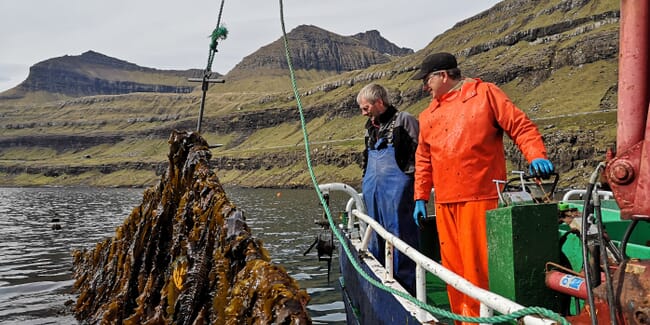
Ocean Rainforest is currently the largest seaweed producer in Europe © Harald Bjorgvin
The EU is one of the biggest importers of seaweed products globally, which growing demand in food, cosmetics, pharmaceuticals and energy production. The proposal comes in the form of a communication Towards a strong and sustainable EU algae sector, suggesting ways to help the industry grow into a robust, sustainable and regenerative sector capable of meeting the growing EU demand.
The farming of macroalgae can also help regenerate the ocean and seas by removing nutrients that cause eutrophication. It has a low carbon and environmental footprint and a promising potential for carbon sequestration. Microalgae production can also be done on land and far from the sea. They are source of carbon compounds and have applications in wastewater treatment and atmospheric CO2 mitigation.
The 23 proposed actions aim to improve business environments, increase social awareness and acceptance of algae and algae-based products by consumers, and close the knowledge, research, and technology gaps.
Some key actions include:
- Developing a new algae farmers’ toolkit.
- Facilitating access to marine space, identifying optimal sites for seaweed farming and including seaweed farming and sea multi-use in maritime spatial plans.
- Together with the European Committee for Standardisation (CEN), developing standards for algae ingredients and contaminants, as well as for algae biofuel.
- Assessing the market potential, efficiency and safety of algae-based materials when used in fertilising products.
- Examining the algae market and proposing market-stimulating mechanisms to support the transfer of technology from research to market.
- Funding pilot projects for career reorientation and supporting innovative SMEs and projects in the algae sector.
- Conducting studies and discussions to gain better knowledge, amongst others, on seaweed climate change mitigation opportunities and the role of seaweed as blue carbon sinks, define maximum levels of contaminants and iodine in algae.
- Supporting, through Horizon Europe and other EU research programmes, the development of new and improved algae processing systems, novel production methods and algae cultivation systems.
- Promoting awareness-raising actions and analyse availability of algae-related data.
The commission states that the people and organisations active in the algae sector will be key partners for implementing the proposed actions. All those concerned are welcome to join the EU4Algae Forum launched by the Commission in February this year.
Next steps
The Commission will discuss the communication with the European Parliament and the Council. The Commission will coordinate putting the 23 actions into practice with the member states, industry (e.g. via the EU4Algae Forum) and other relevant stakeholders.
The Commission will prepare a report assessing progress in implementing the communication by the end of 2027.




